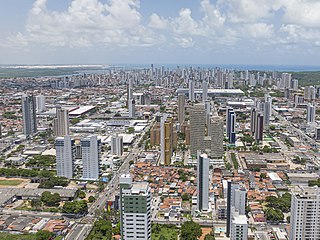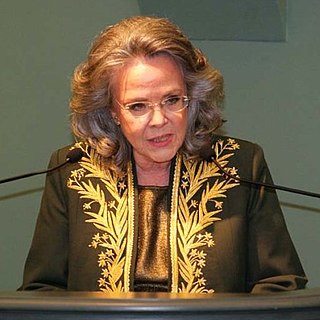
Rio Grande do Norte is one of the states of Brazil. It is located in the northeastern region of the country, forming the northeasternmost tip of the South American continent. The name literally translates as "Great Northern River", referring to the mouth of the Potengi River.

Natal is the capital and largest city of the state of Rio Grande do Norte, located in northeastern Brazil. According to IBGE's 2021 estimate, the city had a total population of 896,708, making it the 19th largest city in the country. Natal is a major tourist destination and an exporting hub of crustaceans, carnauba wax and fruits, mostly melon, sugar apple, cashew and papaya. It is the country's closest city to Africa and Europe, with its Greater Natal International Airport connecting Natal with many Brazilian cities and also operating some international flights. The city was one of the host cities of the 2014 FIFA World Cup.

América Futebol Clube, commonly referred to as América de Natal, is a Brazilian professional club based in Natal, Rio Grande do Norte founded on 14 July 1915. It competes in the Campeonato Brasileiro Série C, the third tier of Brazilian football, as well as in the Campeonato Potiguar, the top flight of the Rio Grande do Norte state football league.

Floresta is a city in the Brazilian state of Pernambuco. It is situated at latitude 08º36'04" south and at longitude 38º34'07" west, at an altitude of 316 metres. Its population was estimated in 2020 to be 33,184 inhabitants, according to the Brazilian Institute of Geography and Statistics. It has an area of 3644.17 km².
The Caetés (Kaeté) were an indigenous people of Brazil, linguistically belonging to the Tupi people.

Nísia Floresta Brasileira Augusta, pseudonym of Dionísia Gonçalves Pinto, was a Brazilian educator, translator, writer, poet and feminist.

Timóteo is a Brazilian municipality in the state of Minas Gerais, located by the Piracicaba River. The population as of 2020 was 90,568 inhabitants. The city is situated in the metropolitan area of the Steel Valley. It is the hometown of Aperam South America, a steel factory specialized in the production of stainless steel, now named Aperam.

Nísia Floresta is a municipality in the state of Rio Grande do Norte in the Northeast region of Brazil.
Tarairiú is an extinct and very poorly known language of eastern Brazil. The Tarairiu nation was divided into several tribes: the Janduí, Kanindé, Paiaku, Jenipapo, Jenipabuçu, Javó, Kamaçu, Tukuriju, Ariu, and "Xukuru" / Xacó.

Rio dos Sinos is a river in the state of Rio Grande do Sul, southern Brazil. It rises in the hills east of Caraá at elevations above 600 metres (2,000 ft) and covers a distance of about 190 kilometres (120 mi), flowing into the delta Jacuí in Canoas, at an elevation of only 5 metres (16 ft).

Macaíba is a microregion in the Brazilian state of Rio Grande do Norte.

Events in the year 1981 in Brazil.
The Açu National Forest is a national forest in the state of Rio Grande do Norte, Brazil.
Nísia Floresta National Forest is a national forest in the state of Rio Grande do Norte, Brazil.
The origins of feminism in Brazil trace back to the 19th century. During the Empire of Brazil, some jurists attempted to legalize women's suffrage, with or without the consent of the husband. Later, the republican constitution of 1891 did not exclude women from voting, because they were not considered individuals who could have rights. That made some women request, without success, their inclusion among the voters. The 1891 constitution initially had a clause that gave women the right to vote, but it was abolished in its last version because the idea that politics was not an honorable activity for women prevailed.

Rosiska Darcy de Oliveira is a Brazilian journalist and feminist writer.











